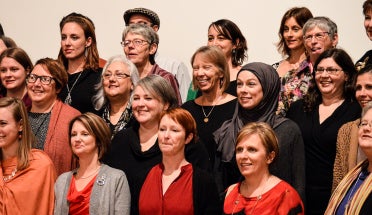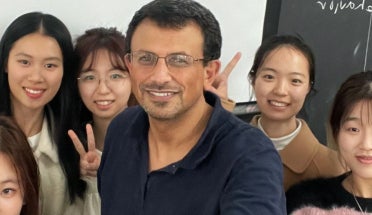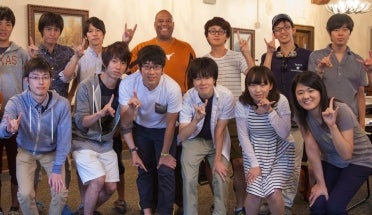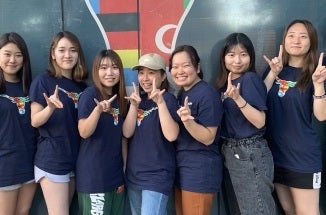
Japanese Student Discovers New Passion During English Language Center Program
- Feb 7, 2023
- English Language Center
- by Kayla Johnson
In 2022, Hinako Nakayama and nine other Japanese students participated in a 13-week intensive program in Austin, a collaboration between Ritsumeikan Asia Pacific University (APU) and The University of Texas at Austin’s English Language Center (ELC).
While at UT Austin, the students took English language classes, audited a university course and participated in unpaid internships with campus departments and community organizations. Though the APU program began in 2017, the Fall 2022 cohort was the first to arrive on campus since the outbreak of the Coronavirus pandemic.
The ELC offers international students a variety of language-learning programs and resources, including intensive English courses and cultural and social activities. The almost 600 students who enroll in ELC programs each year represent more than 36 countries.
Gaining Comfort in Diverse Environments
As special programs coordinator for the ELC, Rachelle Bumgardner manages short-term, customized programs like the APU program. In contrast to the semester-based tracks the ELC also offers, customized programs are specially designed to host sponsored students at the request of a university or organization.
“It’s my team’s job to make [visiting students] feel at home through these experiences,” Bumgardner said.
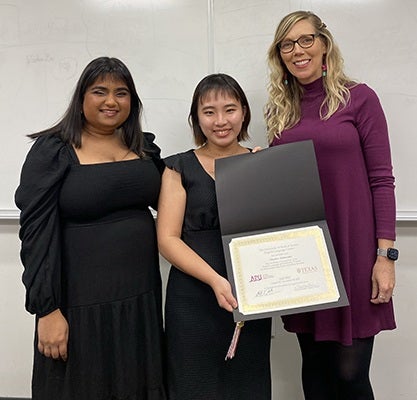
Learning to navigate the real world in English is the first challenge participants must overcome, Bumgardner said. “The more they get comfortable with that during the semester, the more I see them develop in other ways. They come out of their shell,” she said.
Interestingly, about one-half of APU’s population is composed of international students. So, while most students coming to UT Austin for the APU program are Japanese, students also have come from neighboring countries like China and South Korea. Bumgardner said that since students are used to a diverse learning environment at home, they often come to the Forty Acres more open-minded about diving into the ELC experience.
Building Skills, Making Connections
Nakayama embarked on her study abroad experience with three goals: to improve her English skills, immerse herself in the American work culture and explore all that Austin has to offer. She left the experience not only with a new worldview, but also with a newfound passion and deeper understanding of herself.
She took four English language classes, focused on speaking, listening, writing and grammar. In Japan, English education is based mostly on reading and writing for papers and exams, she explained, but it often doesn’t provide hands-on practice. That’s why she appreciated how her ELC courses taught vocabulary through context. When the class finished a unit on the law, for example, the professor took them to a courthouse to watch a trial in action.
“I thought that was a really interesting and practical way of teaching. I learned English while I was enjoying myself, so it was fun,” Nakayama said.
She also connected with American students in her audited course on LGBTQ studies. When she introduced herself to the class for the first time, a student who was learning Japanese reached out to her and offered to help her with the classwork. They ate lunch together and began getting together outside of class.
The APU program’s internship placements offer another avenue for students to build skills and relationships. Students worked at UT Austin’s international office, Texas Global, the Blanton Museum of Art and the Austin Central Library, among other places. These internships are designed to provide authentic English practice and to give students a taste of American workplace habits, also allowing students to develop hard and soft skills by giving presentations and working in customer service.
Nakayama worked with UT Austin’s event planning department. At first, she found it challenging to work completely in English and struggled to communicate with her supervisor. But with time, she developed a positive impression of American work culture, especially its emphasis on work-life balance.
Finding Community Across Cultures
Community also arose in the form of the Austin Oita Sister Committee, which Nakayama accessed with Bumgardner’s help. Beppu, the city where APU is headquartered, is part of the Oita prefecture; Oita City, the capital of this prefecture, is a sister city of Austin, meaning the two cultivate their shared cultural and commercial ties.
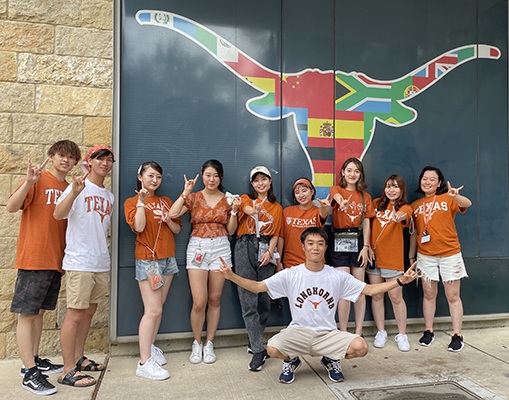
Monthly ELC-led excursions further immersed students in Austin’s lively atmosphere. These trips included their first Texas football game, a tour of the State Capitol building, shopping for Halloween costumes and cruising under Congress Avenue Bridge to watch millions of bats take flight. There were two out-of-town day trips to San Antonio and Houston. Students were also encouraged to participate in other social events with international students or plan their own trips to other cities or states on free weekends.
Sparking New Passions
Nakayama’s three months also sparked a new passion: teaching English. To reach this goal, she is taking a leave of absence from APU to pursue a teaching license. She said she wants other Japanese students to learn, as she did through her ELC courses, that the process of learning English can itself be useful and practical.
“I would like to be a teacher who can prove that the future is full of possibilities and choices,” Nakayama said.
She added that she hopes other students realize how many opportunities there are to learn about new perspectives — and she hopes they seize them.
“If you want to do some new things, I highly recommend studying abroad,” she said. “That produces more experiences and expands your future.”

